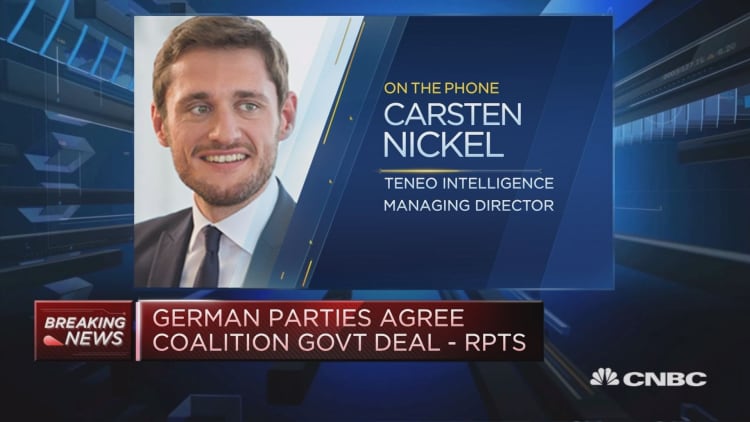
Political leaders in Germany have reached a breakthrough in talks to form a new coalition government, following months of uncertainty after elections in September failed to produce an overall majority for any party.
German Chancellor Angela Merkel's Christian alliance (the CDU-CSU) and the Social Democrats (SPD), led by Martin Schulz, have agreed on a deal to form a coalition government. Speaking at a press conference on Wednesday afternoon, Merkel said the talks had been difficult, but worth it.
"I am convinced the coalition treaty can be the basis of a good and stable government," she said, adding that solid finances, infrastructure investment and digitalization would be key focuses for the government.
German newspaper Bild reported that Merkel's Christian Democratic Party (and its sister party, the Christian Social Union, or CSU) will be given the economy and defense ministries in the agreement, while the SPD was reported to have been given the finance ministry.
German news agency DPA also reported that the SPD's Olaf Scholz, currently mayor of Hamburg, is to become the finance minister. The Exterior Ministry is also said to have been given to the SPD with speculation that party leader Schulz could be put in charge.
Merkel said compromises had been made, especially in the division of ministries. She also noted that many conservatives will not be happy with the SPD taking over the finance ministry.
Talks between the parties have been going on for days, having missed a self-imposed deadline of Sunday, and went into the night on Tuesday. In particular, health care and labor market policy proving sticking points in the talks.
SPD membership ballot a 'real problem'
If confirmed, the deal will still have to be approved by the SPD's 464,000 party members before the party can join Merkel's CDU-CSU alliance in power.
Carsten Nickel, managing director for Europe at Teneo Intelligence, told CNBC on Wednesday that the SPD membership ballot was a "real problem" ahead.
"Let's make no mistake, the real risk, the real problem for the SPD leadership is still ahead and that's the membership ballot," he said.
The SPD's party delegates voted to enter into coalition talks at a party congress in January, the party rank and file that Nickel said had an interest in organizing its voter behavior. The party members could be harder to predict, however.
"With the membership (ballot) it will be a very different game, turnout will be very key. Whether the pragmatic majority that probably accepts this deal, although they'll by no means love it, turns out to support this deal will be key."
Elections back in September
Months have passed since the country's federal election back in September 2017, which failed to produce an outright winner. The result led to protracted talks between major and minor political parties in Germany aimed at forming a coalition government.
The SPD had previously promised its supporters not to re-enter a so-called "grand coalition" with the CDU-CSU after performing badly in the election. It entered talks after negotiations between Merkel, the Green Party and Free Democratic Party ended in failure.
The stakes for the latest talks were high given the changing political landscape in Germany. The election in September saw the far-right Alternative for Germany (AfD) become the country's third largest party and enter the German Bundestag for the first time, unsettling the political establishment and many voters.
Sticking points
Immigration has become a key issue in German politics and is largely seen as leading to the rise in support for the AfD.
Teneo Intelligence's Nickel noted that immigration had been a key topic (and bone of contention) for the SPD and the right-wing of Merkel's party, while financial markets had been watching for agreements on closer euro zone integration.
"But I think the real issue here from the perspective of SPD members is something very different, the questions are over health policy, pensions and the labor market," he said, adding that while the SPD had got "some improvements" from Merkel's party, there had been no offer of reforms.
Nickel said that more fiscal spending was "a given" as a result of the likely deal.
—CNBC's Annette Weisbach contributed reporting to this story.


